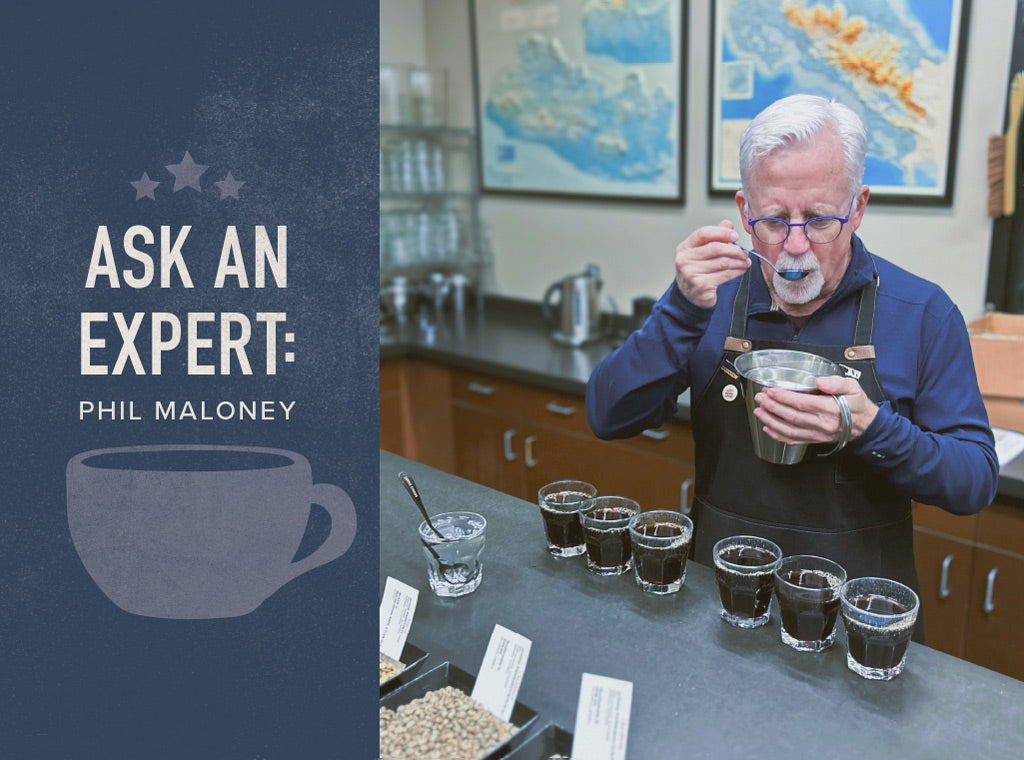
Ask an Expert: Phil Maloney
We love sourcing, roasting, smelling, tasting, crafting, drinking, and talking about coffee. We asked coffee expert Phil Maloney, Peet’s Senior Director, Coffee Purchasing, some questions about everyone's favorite subject.
How far have you travelled for coffee, and why?
My job is looking for coffee in remote places—the best coffee growing regions in the world—many quite far—New Guinea, East Africa, South America. Why? Because you need to have that diversity in origin in order to have really complex blends.
What’s your favorite brewing method?
French press, hands down. Every day of the week, I brew a French press. I like it because it’s a bigger, fuller cup. I like the texture; I like the body. And, for me, it’s a purer way of drinking coffee. Immersion brewing is water in contact with coffee and direct steeping rather than putting the coffee through a filter. You get a lot more of the rich texture because it’s not filtered out. I also just love the ritual of making a French press. You pour water over the grounds, and you watch it bloom, then you continue to pour water over the grounds, and you smell the aroma, then you plunge it. It’s more active than other brewing methods. It’s deliberate.
What aspect of Peet’s do you think people don’t know about, but should?
I think people don’t realize the extent of our coffee selections. Not just what someone finds on the shelf, but I wonder if people know that we source from 25 countries around the world—purposefully—because we love the origins. And even within the origins, there are regions that all taste different. We buy flavor, and origin is flavor. People may not realize the extent we go to in our selections: the origins, the regions, the entire coffee procurement process, sensory evaluations, approvals, and all of that takes place before we thoughtfully craft formulas to achieve a specific flavor and taste profile. People may think that we simply buy coffee, roast it, but it in a bag, and it tastes good. It’s not that simple.
And I wonder if people are aware how involved we are with our supply chain. We do projects all over the world, from clean water initiatives to research for climate smart genetic varieties to providing coffee seedlings to farmers. From funding coffee tree stumping and other agronomy initiatives to building schools and clinics. We think it’s important to give children the opportunity to be in school or in daycare, so we fund those projects at origin. All of these initiatives help farmers produce better coffee, but at its core, it’s doing good in coffee communities. I hope Peetniks know about the good work we do in our partner communities. These are our partners. We work with them and support them however we can. When we think of the value of community—and it is a value for us—our community at Peet’s goes beyond our coffeebars. Our community is all of the coffee communities in the world where we source. It’s a big community.
What’s your wildest coffee story?
I remember a trip to Ethiopia. It was quite remote, off the grid, and we were going to visit this one particular coffee farm. It was so remote that we were beyond conveniences: camping in a small tent with no electricity or plumbing, cooking on a little gas stove, and we were out in this beautiful Ethiopian landscape with trees and coffee plants, the sounds of the birds … drying beds as far as you could see, across a stream and into the forest of shade trees. All I could see was forest, knowing that the coffee was growing under that forest canopy. I could hear singing from the village in the distance, under that huge sky with no light pollution. And I thought: this is where it all started, this is the birthplace of coffee, of mankind. And I’m out here sleeping under the stars.
FINAL QUESTION
What are you drinking right now?
We buy coffee from this women’s group in Huila, Colombia year-round, because the quality is so good. These women growers are very attentive to coffee production, from taking care of the plants to processing—all the way through. And these microlots that make up Madres y Maestras are what we’ve selected as the best of the best.
Huila is a great place to grow coffee: high altitude, volcanic soil, 560,000 small coffee growers, it’s part of the culture in Colombia, it’s everywhere. The coffee is a curated blend: all microlots, all women grown from twelve women selected out of a group of over 150 women growers. And it’s just a delicious, delicious coffee. It’s one of those coffees where you say, “what else could you possibly want in a coffee?” It’s so bright, so chocolatey, so complex…it’s just delightful. The kind of coffee you’ll want to have a third cup of alongside your pancakes.


